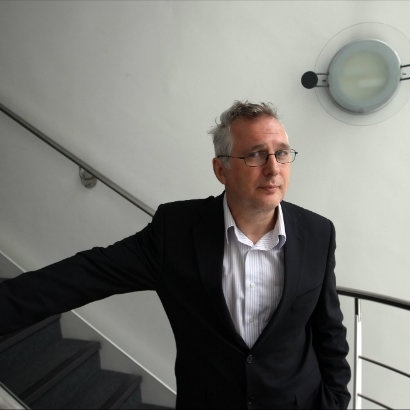Life as a fan of Alan Hollinghurst is a game of patience. You have to wait a good few years for the next fix to come along – but it’s worth it.
Hollinghurst may have started his career back in 1988 with The Swimming Pool Library but he cemented himself as one of the UK’s leading writers in 2004 when he won the Booker Prize for the wonderful Line of Beauty, an exploration of gay life in the 80s written against the backdrop of the AIDS crisis and Tory politics.
Now he is back with a new novel, The Sparsholt Affair. It is familiar territory for Hollinghurst, a work that spans through the ages from World War Two to present day, set against the milieu of a family scandal.
As with other Hollinghurst novels, the action centres on Oxford. “I was interested in Oxford during the war,” Hollinghurst explains to Manchester Literature Festival host, Rachel Cooke, at Central Library. “I was interested in a scandal colouring the lives of the future generation, especially with an unusual name that they couldn’t escape from.”
The book is told through contrasting character viewpoints. “I like the idea of layering one generation over another.”
As the protagonist moves to London and sets up home in a house with other gay men, he’s “expanding into a new life under the shadows of the past”. Hollinghurst adds: “I tend to return to the theme of a house as I did in Line of Beauty but this is more bohemian.”
 The latter part of the novel encompasses two elements that he has never tackled before, namely gay men with children and mobile phones. Hollinghurst has traditionally shied away from this as modernity tends to bring easy answers – where is the jeopardy if we can just Google the answer?
The latter part of the novel encompasses two elements that he has never tackled before, namely gay men with children and mobile phones. Hollinghurst has traditionally shied away from this as modernity tends to bring easy answers – where is the jeopardy if we can just Google the answer?
Cooke wonders if he thinks that this immediacy has affected our reading habits in general. “I feel we are less able to concentrate on things. But I don’t feel we have lost the durability of long-form fiction. I am repeatedly drawn back to periods where being gay is clandestine as it’s more attractive to a writer.”
An audience member asks how Hollinghurst avoids repetition. “There is a core group of subjects that I keep coming back to,” he replies. “Some writers go to completely new territory, and I envy that. I find that if you like the world of a writer, you never tire of them.”
But how much of Hollinghurst is in his own characters? He acknowledges that you can’t help putting a little of yourself into a character but he hopes to “spread myself out amongst characters”.
 “I’ve never wanted to write something totally autobiographical,” he adds.
“I’ve never wanted to write something totally autobiographical,” he adds.
The final question from an uncharacteristically shy Manchester audience was centred around the sex quota of his books, which has lessened as he progresses through his career.
“This is not an active decision on my part,” he laughs. “For my previous book [The Stranger’s Child], heterosexual male reviewers complained that there wasn’t enough sex, but the point of the book was that you don’t know what’s gone on. I carried that over into this book.
“I think it is sexy to take people to the bedroom door and leave them there. Less sex in my books is not through any loss of interest in the subject.”
The Sparsholt Affair is published by Pan Macmillan and is now available to buy











